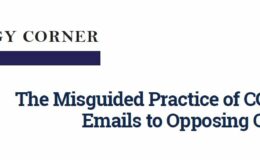The Woes of Citing Wikipedia in Court Pleadings
- By : Cbh
- Category : Ethics, Uncategorized
In a federal court case out of Kentucky, defense counsel reportedly cribbed portions of the brief from… Wikipedia. And then from a Federal Judicial Handbook. Both times without proper citation.
Before getting to the orders, we note the case has the narrowest connection to Florida.
In a February 2011 order, the court wrote:
The court notes here that defense counsel appears to have cobbled much of his statementof the law governing ineffective assistance of counsel claims by cutting and pasting, withoutcitation, from the Wikipedia web site. Compare Supplemental to Motion for New Trial (DN 199)at 18–19 with http://en.wikipedia.org/wiki/Strickland_v._Washington (last visited Feb. 9, 2011).The court reminds counsel that such cutting and pasting, without attribution, is plagiarism. Thecourt also brings to counsel’s attention Rule 8.4 of the Kentucky Rules of Professional Conduct,which states that it is professional misconduct for an attorney to “engage in conduct involvingdishonesty, fraud, deceit or misrepresentation.” SCR 3.130(c). See also In re Burghoff, 374 B.R.681 (Bankr. N.D. Iowa 2007) (holding that counsel’s plagiarism violated identical provision ofIowa Rules of Professional Conduct). Finally, the court reminds counsel that Wikipedia is not an acceptable source of legal authority in the United States District Courts. (emp. added)
Thereafter, in an April 2011 order, the same mischief re-appeared:
As the United States points out, defendant’s counsel has apparently continued with thismotion his practice of copying, without sufficient attribution, substantial portions of other works intohis own. The court noted in its February 9 Memorandum Opinion that defendant’s counsel had cutand pasted a portion of his brief from the web site Wikipedia. It has now come to the attention ofthe court that portions of the defendant’s motion for release pending appeal appear to have beencopied from a Federal Judicial Center handbook on the Bail Reform Act of 1984. Compare Motionfor Release Pending Appeal (DN 244) at 5, 10–11 with DAVID N. ADAIR, JR.,FED. JUDICIAL. CTR.,THE BAIL REFORM ACT OF 1984 39–40, 41–42 (3d ed. 2006). The court reminds counsel that it isinappropriate to repeat, verbatim, substantial portions of other works in a manner that makes suchwork appear to be the brief writer’s own. The court also reminds counsel that the proper way to citequotations of source material is by a direct citation to the source, not through use of a “see also”signal at the end of a lengthy string citation. See THE BLUEBOOK: A UNIFORM SYSTEM OF CITATIONR. 1.2(a) at 54 (Columbia L. Rev. Ass’n et al. eds., 19th ed. 2010) (explaining that no signal is used“when directly quoting an authority,” whereas the “see also” citation is used when “[c]ited authorityconstitutes additional source material that supports the proposition.”).
Keith Lee, at An Associate’s Mind, beat everyone to the Citations-to-Wikipedia debate with this post, where he found instances where Wikipedia was cited as an appropriate source.
While we are crediting our sources, check out this ABA Journal article, which caught our attention. Make sure you read some of the helpful and creative comments by other readers. We too have to credit the Legal Writing Prof blog, and its commentators, who provided the cites as well as some insights.
Finally, one person who commented on the ABA Journal article raised this 2008 article from Trial, Courting Wikipedia.


